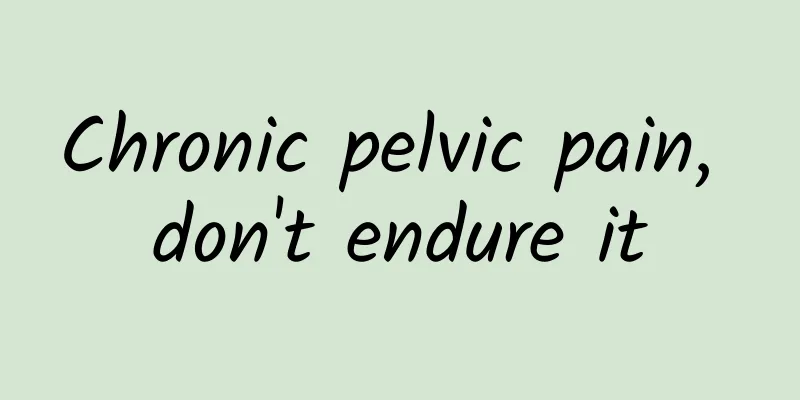Chronic pelvic pain, don't endure it

|
Author: Lou Wenjia Peking Union Medical College Hospital Reviewer: Zhu Lan, Chief Physician, Professor, Doctoral Supervisor, Peking Union Medical College Hospital Many women experience lower abdominal pain that lasts for a long time. Don't endure it. There is a disease called "chronic pelvic pain". It is recommended to go to the hospital for evaluation and treatment as soon as possible. What is chronic pelvic pain? Chronic pelvic pain is relatively common, and 10% to 40% of women who seek medical help in gynecological clinics come for this reason. This pain has nothing to do with the menstrual cycle and is often caused by inflammation, which will inevitably affect the quality of life and mental health of women. The occurrence of chronic pelvic pain is not only related to the female reproductive organs, but also to the intestinal and urinary systems. If the lower abdominal/pelvic pain lasts for more than 6 months, you should consider whether you have chronic pelvic pain. Figure 1 Copyright image, no permission to reprint 2. The causes of chronic pelvic pain are complex, so you should pay more attention to observation. Many female friends do not pay enough attention to chronic pelvic pain, thinking it is caused by cold or dysmenorrhea, and thus neglect its treatment. The causes of chronic pelvic pain include the following 6 kinds. 1. Endometriosis Endometrial tissue grows outside the uterus, which can not only cause chronic pelvic pain but also may lead to infertility. If female friends experience severe lower abdominal pain during menstruation, they should pay more attention and go to the hospital to check whether they have endometriosis. 2. Pelvic inflammatory disease If acute pelvic inflammation is not treated in time, the pain will persist, and even after treatment, the pain will continue for a period of time. 3. Irritable bowel syndrome If there is a problem with intestinal peristalsis, it will cause diarrhea and constipation, causing abdominal pain. This phenomenon is called irritable bowel syndrome, which may also cause chronic pelvic pain. 4. Bladder pain syndrome is also known as interstitial cystitis. This disease causes pain if you hold your urine, and the pain will subside after urination. Women with this condition will not only feel pain, but also often want to go to the toilet. Figure 2 Copyright image, no permission to reprint 5. Pelvic floor myofascial pain: Pain in the fascia connecting the pelvis and muscles can develop into chronic pain over time. 6. Fibromyalgia Pain can occur in many areas of the body besides the pelvis. In addition to the above reasons, other reasons may also cause chronic pelvic pain. Therefore, when women experience lower abdominal or pelvic pain, they must go to the hospital for examination in time to clarify the condition and cause. 3. If you have chronic pelvic pain, you should get checked in time The causes of chronic pelvic pain are relatively complex, and the examination items generally include the following 7 items. 1. Gynecological examination Gynecological examination is a routine basic examination. During the gynecological examination, if the leucorrhea is found to be purulent and accompanied by a foul odor, it is necessary to consider the possibility of pelvic inflammation. If it is not treated in time and is not cured, it may develop into long-term chronic pain. Figure 3 Copyright image, no permission to reprint 2. Routine examination of secretions. Secretion examination refers to the culture of vaginal cervical secretions and vaginal secretions. If pathogenic strains are cultured, it also indicates pelvic inflammation. It can also guide doctors to select effective antibiotics based on the results of drug sensitivity tests. 3. Routine blood test Routine blood test can indicate whether there is infection, so it can be determined whether chronic pelvic pain is caused by infection. 4. Bimanual pelvic examination Bimanual pelvic examination is a very important item, which is what we often call gynecological internal examination/manual examination. Through this two-handed method, check whether there are any abnormalities in the vagina, cervix, fallopian tubes and pelvic wall. If a lump can be felt in the abdomen and there is tenderness, further examinations such as B-ultrasound and MRI can be performed to determine whether there is endometriosis cyst, etc. 5. Urinalysis Vaginal and urethral secretions and urine are prone to cross infection. If you have urgency or frequent urination, you should do a urine routine test to see if you have a urinary tract infection. 6. Pelvic ultrasound examination Pelvic effusion and lesions can also cause chronic pelvic pain. Pelvic ultrasound can detect pelvic effusion and also check the lesions of the uterus and its appendages. 7. Colonoscopy Colonoscopy can rule out whether chronic pelvic pain develops from intestinal diseases. Conclusion In short, chronic pelvic inflammatory disease and chronic pelvic pain cannot be completely equated. There may be many reasons for women to experience persistent abdominal pain. We cannot take it lightly, let alone blindly use antibiotics. We should go to the hospital for timely examination to find the exact cause of the disease so that we can get the correct treatment and relieve the pain as soon as possible. |
<<: Diagnosing Epilepsy in Children - How Much Do You Know?
>>: What causes itchy skin in the elderly? How to prevent and treat it?
Recommend
How should women take care of their private parts? Make you healthier
Female friends should realize that private hygien...
Can I eat Agaricus bisporus during menstruation?
Diet is very important to us. A good diet will br...
What causes uterine prolapse
Nowadays, many women choose natural childbirth du...
Big hand holding small hand, beware of "elbow pulling"
1. What is “pulled elbow”? "Stretched elbow&...
What to do if you feel nausea and stomach upset during early pregnancy
In the early stages of pregnancy, pregnant women ...
What is the temperature in Yunnan in May? What is there to do in Yunnan?
Gentle breeze, drizzle, fresh air... People who a...
Can I apply hot compress when I have leg cramps? How can I help myself when I have leg cramps while swimming?
Every time when the seasons change, many people w...
What are the precautions for exercising during menstruation?
Women during their menstrual period will encounte...
After "Yang Kang", please pay attention! Don't rush some things——
Source: CCTV News Client...
The dangers of long-term use of gel
Nowadays, many women are suffering from the probl...
How much does it cost to give birth naturally?
Although the state provides certain economic deve...
How long does it take for potatoes to be effective in removing dark circles?
Many people know that potato masks can be used to...
Mammary duct dilatation 3 mm
Mammary duct dilatation of 3mm is a condition cau...
What are the dangers of not treating ovarian cysts?
For women, ovaries are the most prominent feature...
Introduction to the swelling of the first few months of pregnancy
Pregnancy is a big deal. For women, pregnancy mea...









